2018 Lunch Lectures
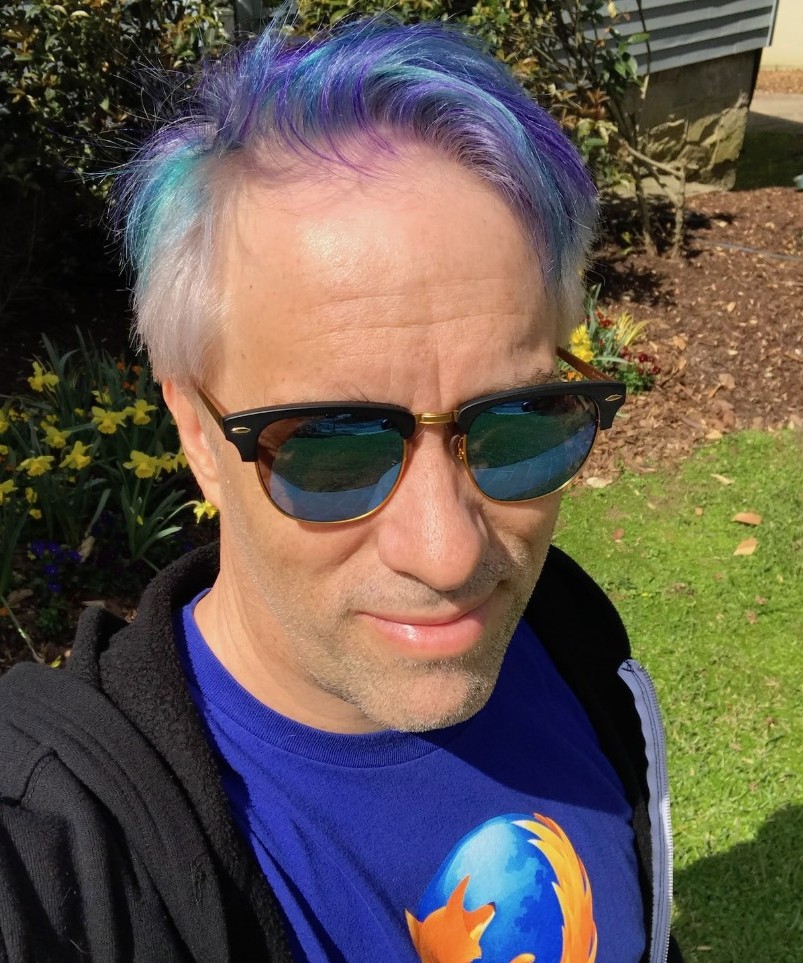
"WebXR and the Immersive Web: Past, Present, and Future"
Speaker: Blair MacIntyre
Date: 2018-11-29 12:00:00
Location: TSRB (1st Floor Ballroom)
ABSTRACT
It is easy to imagine a future where cheap and powerful stand-alone head-worn AR and VR displays are central to the average person's everyday computing experience. To ensure that the open web remains healthy in this new world, web APIs and standards must be created to ensure that immersive experiences can be created, delivered and consumed as freely as the 2D web is now. Over the past two years at Mozilla, I’ve worked as part of the Immersive Web community to bring AR and VR to the web, and web-based XR will soon be a reality. In the near future, we will see prototype implementations of the WebXR Device API begin to appear in major browsers on phones, tablets, traditional computers and stand-alone AR and VR head-worn displays. In this talk I will discuss how WebXR might support the diversity of sensing and world knowledge future AR devices will make available to applications, including geolocation, content persistence, and advanced capabilities like custom computer vision.
SPEAKER BIO
Blair MacIntyre is a Principle Research Scientist in the Emerging Technologies group at Mozilla, and a Professor of Interactive Computing at Georgia Tech. He has been doing AR research and development since 1991, founded the Augmented Environments Lab at Georgia Tech in 1999, and joined Mozilla in 2016. He has been working on bringing AR to the web since 2008, when he helped start the open-source Argon project at Georgia Tech. At Mozilla, he is leading the effort to bring high performance AR to commodity web browsers. He has worked on AR systems in military, industrial, educational, entertainment, and gaming domains, and consults on technical and legal issues in AR.

"Track the Monkey!"
Speaker: Tucker Balch
Date: 2018-11-15 12:00:00
Location: TSRB (1st Floor Ballroom)
ABSTRACT
We report on an NIH-funded joint effort between Georgia Tech and Emory/Yerkes to study a group of 45 rhesus macaque monkeys housed in a 1/4 acre outdoor enclosure. The system we designed and deployed enables us to track the position of the monkeys in the enclosure to a resolution of about 20 cm at 30 hertz. The data we are collecting enables us to analyze the social structure of the monkey group and to identify important activities like illness, fighting and mating. In this talk I will report on the design of the underlying technology we have developed to support this research, some of the studies we have conducted already as well as anticipated next steps. Besides the speaker, our team includes: David Byrd, Scott Gilliland, Brian Hrolenok, Chanho Kim, Jim Rehg, Rebecca Roberts and Kim Wallen.
SPEAKER BIO
Tucker Balch is a professor in the School of Interactive Computing. His research centers on the study of social animals and Machine Learning to Finance.
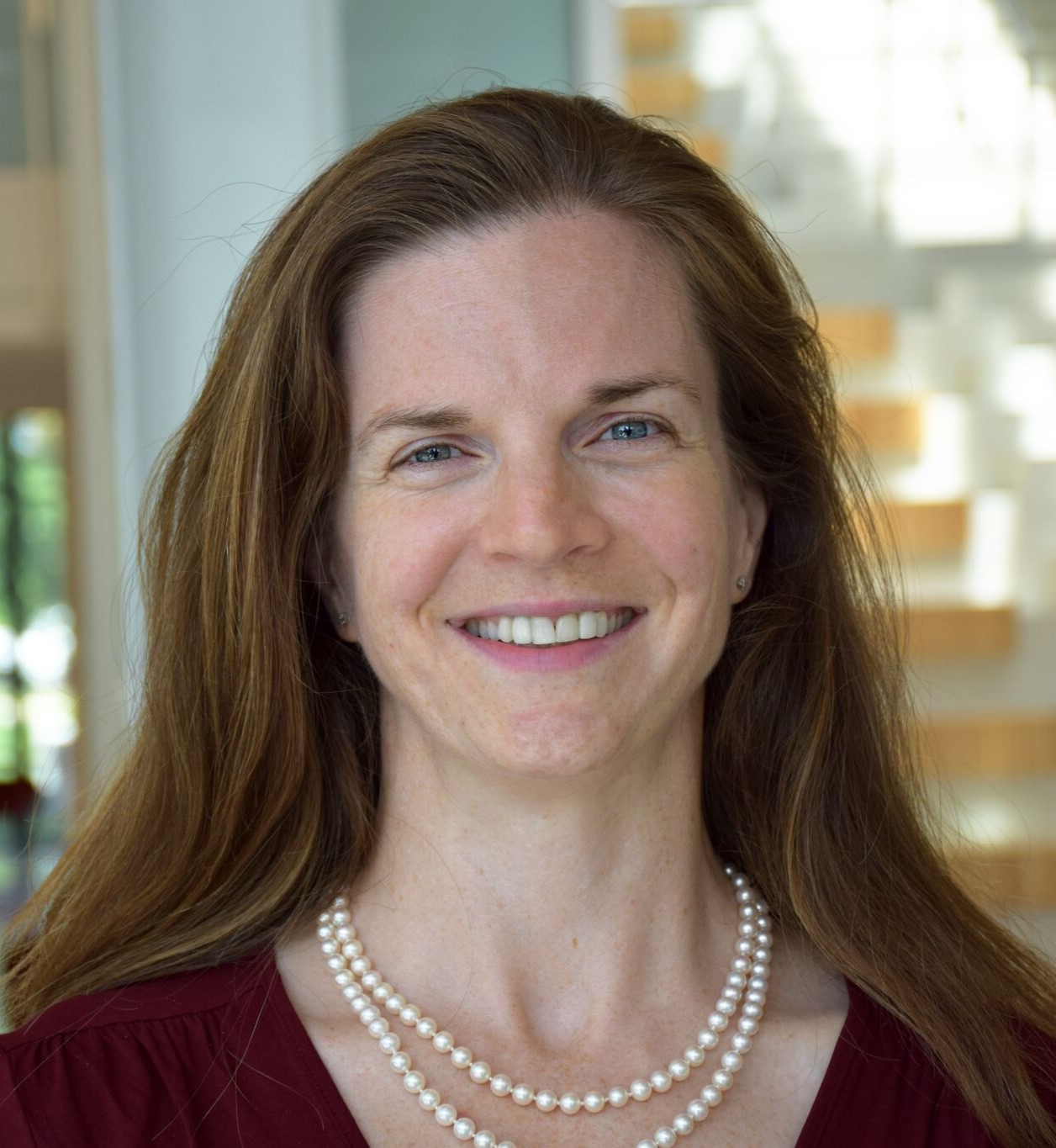
"Amplifying Voices: Inclusively Developing Sociotechnical Health Systems with People"
Speaker: Katie Siek
Date: 2018-11-08 12:00:00
Location: TSRB (1st Floor Ballroom)
ABSTRACT
Human computer interaction researchers engage with people to identify their needs and develop prototypes. Unfortunately, due to multiple resource constraints, populations are typically recruited locally and engaged in activities that do not introduce participants to the possibilities provided by innovative technologies.In this talk, I discuss how we have developed two inclusive methods that empower underserved people to participate in the design process. We created the Asynchronous Remote Communities (ARC) method to engage people from all over the world to identify their needs and engage in design brainstorming. Concurrently, we investigated how to empower people to quickly build their own interactive systems with minimal technical knowledge to inform researchers' ideas of what people want in smart environments. I show with case studies in women's health and aging in place how these methods amplify underserved communities’ voices in the design process. I conclude with insights on how we can iterate on these methods to make them more inclusive and apply them more broadly in computing domains.
SPEAKER BIO
Katie Siek is an associate professor in Informatics at Indiana University Bloomington where she is the Informatics Undergraduate Director and the Proactive Health Informatics Director. Her primary research interests are in human computer interaction, health informatics, and ubiquitous computing. More specifically, she is interested in how sociotechnical interventions affect personal health and well being. She has designed, developed, and deployed mobile and sensor systems to empower underserved communities manage their health. Her research is supported by the National Institutes of Health, the Robert Wood Johnson Foundation, and the National Science Foundation including a five-year NSF CAREER award. She has been awarded a CRA-W Borg Early Career Award (2012), a Scottish Informatics and Computer Science Alliance Distinguished Visiting Fellowship (2010 & 2015), and CEWiT Outstanding Mentor (2018).
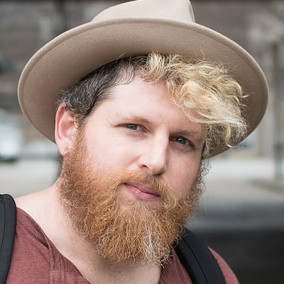
"Project Jupyter and the Rise of Literate Computing"
Speaker: Tony Fast
Date: 2018-11-01 12:00:00
Location: TSRB (1st Floor Ballroom)
ABSTRACT
Project Jupyter is a growing ecosystem of free, open source scientific software for literate and interactive computing. Jupyter's Notebook, and related experiences, are becoming standard interfaces for scientists and engineers in physical and social sciences. The notebook interface is impacting the broader landscapes of research, computing, and teaching where communicating data and code are essential; the stakeholders span industry, academia, and philanthropy. This talk will review the history of Project Jupyter as scientific software born from the Scientific Python (SciPy) community. Since its inception, the community has extended Jupyter to work with over 50 different languages and provided new options for interactive development, research and presentation, including JupyterLab, the next generation of the Notebook. In the broader open source community we find Jupyter tools for grading, batch processing, app development, documentation, tests, and even source code. Notebook interfaces compose literate documents that provide the ability to share human and machine readable knowledge within organizations across diverse disciplines. This talk will highlight recent case studies in Jupyter transforming classroom education, massive collaboration in physics, data-driven journalism, and the entire multimedia experience of learning.
SPEAKER BIO
Tony Fast is a modern scientist with over a decade of experience analyzing unstructured data for cross functional teams in research, business, and security. Currently, he works as an open source consultant assisting organizations in connecting their technology to the scientific Python community. He holds a Ph.D. in Materials Science and Engineering from Drexel University and has B.S. in Ceramic Engineering from Rutgers University. Tony’s research explores the intersection of applied engineering and computer science, trying to understand how open access and interactive computing will transform basic science for the next generation workforce. Tony is actively building diverse communities around open source scientific software technologies in Metro Atlanta. Tony currently organizes the Atlanta Jupyter User Group and PyData Atlanta.

"Bridging The Information Gap: Interactive Feedback Control of Autonomous Systems"
Speaker: Romeil Sandhu
Date: 2018-10-25 12:00:00
Location: TSRB (1st Floor Ballroom)
ABSTRACT
Over the past twenty years, we have witnessed the rise of what has been deemed the artificial intelligence “takeover” leading to advancements from robotic vision to network multi-agent models. While significant advancements have been made, there remains an information gap to develop fully autonomous systems and at best, such frameworks require non-expert operators who possess expert knowledge to combat the risk complexities of highly uncertain environments. During such times of duress, operators often abandon built autonomy due to a lack of trust and intractability of a well-defined (non-convex) solutions. Whether it involves the financial crisis and the FED’s policy towards systemic banking risk, combinatoric cancer targeted drug therapy, to autonomous vehicles and robotics, there exists a need to fuse domain level experts “on-the-fly” in unison with their autonomous counterparts. Simply put, there exist no universal framework and we often utilize human operators to oversee such performance in an on-the-loop fashion to plug potential information gaps. To this end, this talk will introduce an “on-the-fly” feedback control paradigm towards a broad class of optimization problems that can be found both in autonomy and network analysis. At the mathematical core, this talk will focus the interplay of control, geometry, entropy, and optimal mass transport. We will begin by motivating such concepts in robotic vision. From this, we will introduce a control framework of how human interaction can provide operator input to a robotic vision-based system in a user-friendly manner. We will then shift gears to see how geometric and control concepts can be utilized to exploit functionality of dynamic networks often found in social, biological, financial and transportation systems. We conclude with several examples in such fields and show how interactive network control relates to notions of Maxwell’s Demon and perhaps more importantly, provides a generalized framework in which domain level experts can fuse corresponding knowledge to aid in controlling the “unknown-unknown.”
SPEAKER BIO
Romeil Sandhu is currently an Assistant Professor at Stony Brook University with appointments in Computer Science, Biomedical Informatics, and Applied Mathematics & Statistics Departments and is the recipient of the 2018 AFOSR YIP Award for work on interactive feedback control for autonomous systems and 2018 NSF CAREER Award for work on geometric optimization of time-varying networks. Romeil first received his B.S. and M.S. degrees from the Georgia Institute of Technology in Electrical Engineering in 2006 and 2009, respectively. Then, under the direction of Professor Allen Tannenbaum, he completed his Ph.D. in 2011 in control-based vision and learning. Prior to his academic position at Stony Brook, he formed a startup providing government services leading to a successful exit. His academic research lies on the intersection of control, geometry, and statistics applied towards a variety of problems rooted in robotic vision, imaging, networks, systems biology, and autonomy.
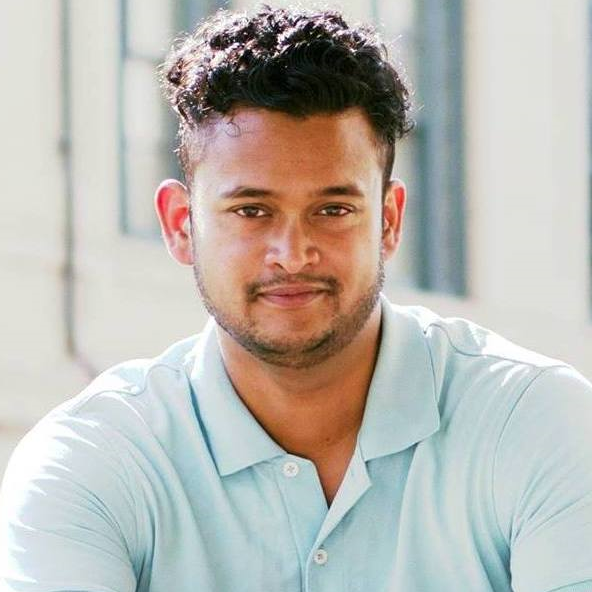
"Social Cybersecurity: Reshaping Security Through an Empirical Understanding of Human Social Behavior"
Speaker: Sauvik Das
Date: 2018-10-18 12:00:00
Location: TSRB (1st Floor Ballroom)
ABSTRACT
Entering an era of pervasive, connected smart things, our cybersecurity decisions increasingly interfere with our social lives. Yet, little is known of the complex social consequences of our security behaviors, and vice versa. Absent this knowledge, it is difficult to develop better, more socially intelligent security systems that are intuitive for the layperson. My work on social cybersecurity bridges this gap. First, I will highlight some data science work on how social factors affect security behaviors through two empirical analyses: (i) an exploratory analysis of how optional-use security tools diffused through the social networks of 1.5 million Facebook users and (ii) a randomized, controlled experiment with 50,000 people. I will then discuss Thumprint, an inclusive authentication system I created based on the results of the prior empirical analyses. Using techniques from both supervised and unsupervised machine learning, Thumprint authenticates and identifies individual members of small, local groups (e.g., families or small work teams) through the acoustic and acceleration profiles of a single, shared secret knock. Taken together, my work points towards a future of socially intelligent security systems that understand and accommodate basic human behaviors, desires and capabilities.
SPEAKER BIO
Sauvik Das is an Assistant Professor of Interactive Computing at the Georgia Institute of Technology. His research, which intersects HCI, data science and cybersecurity, aims to empower people with novel security systems that mitigate costs of time, effort and social capital. His work has won multiple Best Paper and Best Paper Honorable Mention awards at premier venues in HCI (UbiComp, CHI) as well as an Honorable Mention for the NSA’s Best Scientific Cybersecurity Paper Award in 2014. His work has also been widely covered by the popular press, including features on the Financial Times, Slate, Ars Technica and The Atlantic. He is a NDSEG Fellow, a Qualcomm Innovation Fellow, a Stu Card Graduate Fellow, and a NSF EAPSI Fellow. Sauvik earned his Ph.D. and M.S. in Human-Computer Interaction at Carnegie Mellon University and his B.S. in Computer Science at Georgia Institute of Technology.
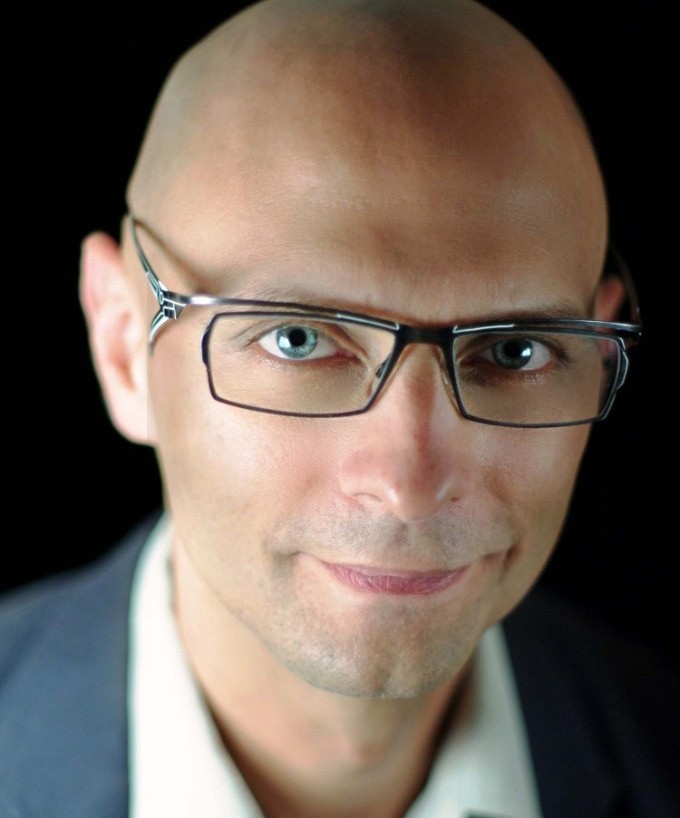
"The Science Of Why We Find Things Compelling"
Speaker: Jim Davies
Date: 2018-10-11 12:00:00
Location: TSRB (1st Floor Ballroom)
ABSTRACT
Why do some things pass under the radar of our attention, but other things capture our interest? Why do some religions catch on and others fade away? What makes a story, a movie, or a book riveting? Why do people rubberneck an accident on the I-75? The past twenty years have seen a remarkable flourishing of scientific research into exactly these kinds of questions. This talk describes the evolutionary underpinnings of why we find things compelling, from art to religion, from sports to superstition. Compelling things fit our minds like keys in the ignition, turning us on and keeping us running, and yet we are often unaware of what makes these “keys,” fit. What we like and don’t like is almost always determined by subconscious forces, and when we try to consciously predict our own preferences we’re often wrong. Drawing on work from philosophy, anthropology, religious studies, psychology, economics, computer science, and biology, Davies offers a comprehensive explanation to show that in spite of the differences between the many things that we find compelling, they have similar effects on our minds and brains.
SPEAKER BIO
Jim Davies is a full professor in the Institute of Cognitive Science at Carleton University, where he has won awards for his teaching and research. He has degrees in philosophy, computer science, and cognitive psychology. As director of the Science of Imagination Laboratory, he explores processes of imagination in humans and machines, and specializes in artificial intelligence, analogy, problem-solving, and the psychology of art, religion, and creativity. His work has shown how people use visual thinking to solve problems, and how they visualize imagined situations and worlds. He is author of over 50 peer-reviewed publications in the fields of cognitive science, artificial intelligence, philosophy, and psychology. He wrote the popular science book Riveted: The Science of Why Jokes Make us Laugh, Movies Make us Cry, and Religion Makes us Feel One with the Universe. He has been asked to speak at three TEDx events, and is co-host of the Minding the Brain podcast. In his spare time, he is a published poet, an internationally-produced playwright, and a professional painter and calligrapher.
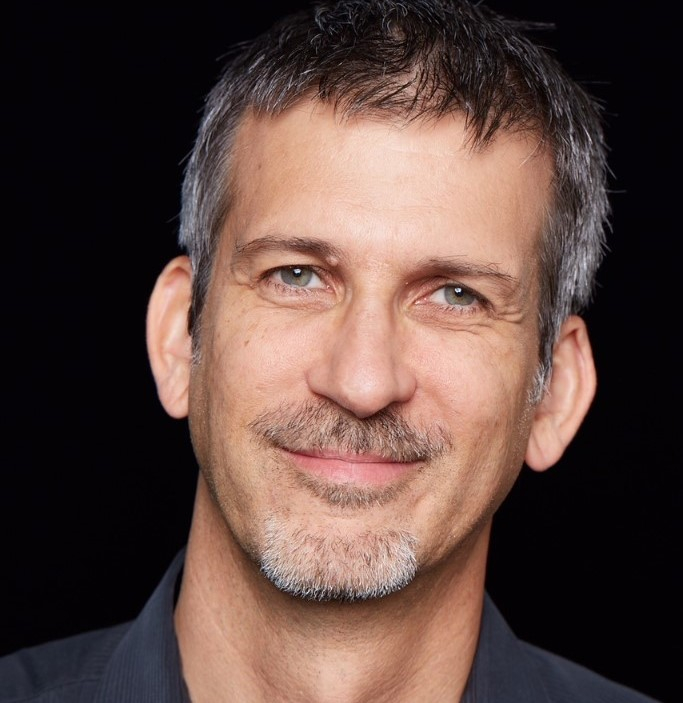
"It’s Time to Build Health Into the OS: How Technology Can Shape Everyday Life to be Healthier"
Speaker: Steve Downs
Date: 2018-10-04 12:00:00
Location: TSRB (1st Floor Ballroom)
ABSTRACT
We live in an age of smartphones, apps, Fitbits, smart watches and other gadgets that can be harnessed to help us become healthy. Since 2014, more than $16B has been invested in 800 startups in the “digital health” space. But what if the role for tech to improve health goes beyond getting us to change our behavior, to adhere to our medication regimens or to improve our care experiences? What if the role of tech runs deeper? Join Steve Downs of the Robert Wood Johnson Foundation as he lays out the case for tech to focus on changing the experience of daily lives at a fundamental level and then leads a group discussion on the interplay of tech, life and health.
SPEAKER BIO
Steve Downs is the Robert Wood Johnson Foundation’s chief technology and strategy officer. In this role, he focuses on the practice of program strategy and on the alignment of the Foundation’s technology strategy and operations with its organizational directions. RWJF’s pursuit of a Culture of Health requires an approach to strategy that is highly flexible and adaptive. In his current role, Downs works with his colleagues to institutionalize an approach to program strategy that is based on the integration of learning, co-creation, and reflection into the processes of strategy development and ongoing strategy assessment and adaptation. Since being appointed chief technology and information officer in 2011, Downs’ goal has been to ensure that RWJF staff have the resources they need to practice philanthropy at the highest level. He has emphasized technology directions—namely mobility and social CRM—that encourage informal knowledge-sharing, data-informed decision-making, and peer-to-peer engagement. Since joining RWJF in 2002, Downs’ career at RWJF has proceeded along two parallel paths: management and programming. Along his management path, he served as the first team leader of the RWJF Pioneer portfolio, helping to shape the portfolio’s direction and initial body of work. From 2007 to 2011, Downs served as the assistant vice president of the Health Group. In this position, he worked with the senior vice president of the Health Group to oversee the Foundation’s strategies and investments in the areas of childhood obesity, public health, tobacco control, and support for vulnerable populations. He also played a key role in helping to shape and articulate the Foundation’s vision for transitioning to a “Web 2.0” philanthropy, one based on values of openness, participation, and decentralization.
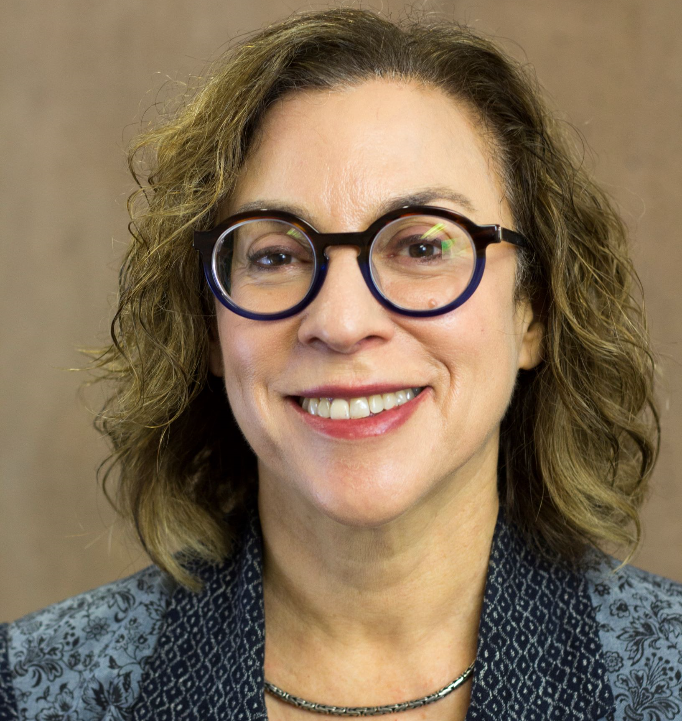
"Understanding the Workplace Experience Through Sensor Tracking of Behavior"
Speaker: Gloria Mark
Date: 2018-09-27 12:00:00
Location: TSRB (1st Floor Ballroom)
ABSTRACT
Understanding the workplace experience is important in order to develop solutions to improve health, mood, and performance, and reduce stress. However, until recently, cognitive, emotional, and behavioral measurements of the workplace experience have been constrained by methodologies based on infrequent measurements or self-reports. The ongoing revolution in the development of sensor technologies is enabling new ways to measure human behavior in situ with precision. With a mixed-methods approach using sensors, along with EMA, computer logging, and repeated surveys, I will present a framework for measuring different attentional states. I will present results showing how attention focus, stress and affect are impacted by digital media use, and how attention focus varies over the workday. This research shows that there are consequences of having access to so many digital information sources: they compete for people's attention, leading to continual attention switching among different information streams and devices. I will discuss the value and challenges of using sensor measures in situ to study and design for digital media use.
SPEAKER BIO
Gloria Mark is a Professor in the Department of Informatics, University of California, Irvine. Her research focuses on studying how the use of digital technology impacts our lives in real-world contexts. She received her PhD in Psychology from Columbia University. Prior to UCI she worked at the German National Research Center for Information Technology (GMD, now Fraunhofer Institute), has been an ongoing visiting researcher at Microsoft Research since 2012, and has been a visiting researcher at IBM, National University of Singapore, and the MIT Media Lab. She was inducted into the ACM SIGCHI Academy and has been a Fulbright scholar. She was the general co-chair for the ACM CHI 2017 conference, and is on the editorial boards of the ACM TOCHI and Human-Computer Interaction journals. Her work has appeared in the popular press such as The New York Times, The Atlantic, the BBC, NPR, Time, The Wall Street Journal and she has presented her work at SXSW and the Aspen Ideas Festival.
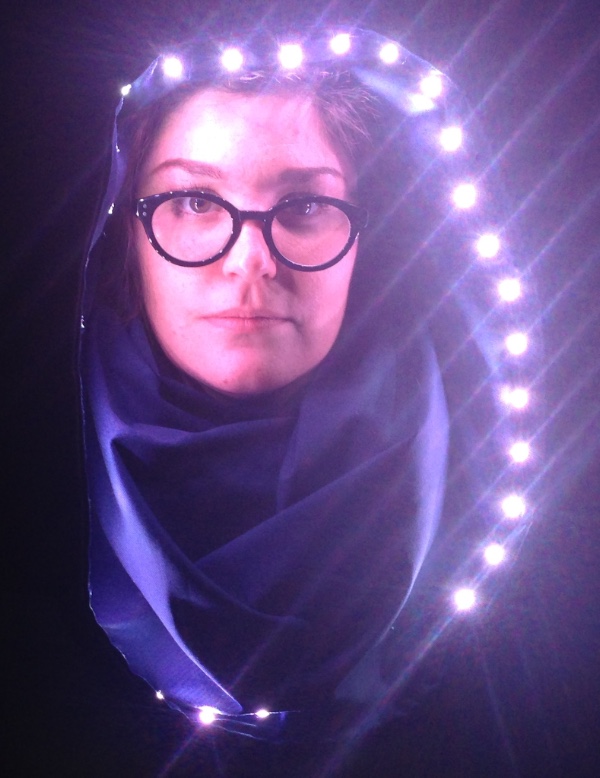
"Designing For Exploration: Using Inefficiency As An Approach"
Speaker: Astrid Bin
Date: 2018-09-20 12:00:00
Location: TSRB (1st Floor Ballroom)
ABSTRACT
The benefits of efficiency and usability in design are well-documented. However, when designing interfaces and experiences for exploration, learning, artistic content, or contexts where there is no task (or when the "task" is emergent), the trajectory is unclear and a task-based approach becomes inappropriate. This talk discusses designing for exploration, and how inefficiency as a design approach can be used to think about and create experiences for creative, narrative, and learning applications.
SPEAKER BIO
Astrid Bin is an artist and technologist. She has exhibited installation and sculpture works worldwide, and is currently a postdoctoral fellow in Digital Media and Music Technology at Georgia Institute of Technology.
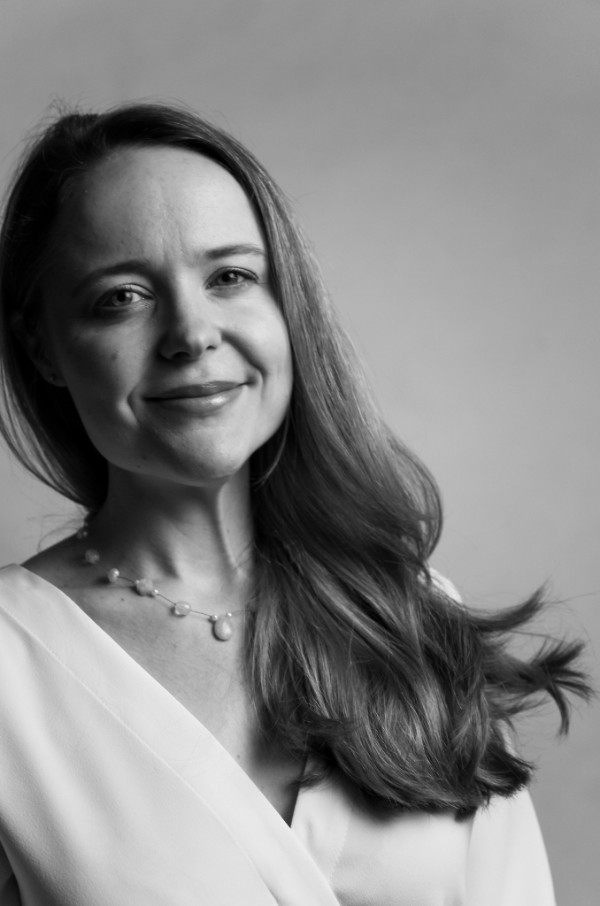
"Inner Rhythms: Music Technologies Informed by Perception and Physiology"
Speaker: Grace Leslie
Date: 2018-09-13 12:00:00
Location: TSRB (1st Floor Ballroom)
ABSTRACT
The Georgia Tech Brain Music Lab is a community gathered around a unique facility combining EEG (brainwave data) and other physiological measurement techniques with new music technologies. Our mission is to engage in research and creative practice that brings health and well-being. This talk will present an overview of our activities at the Brain Music Lab, including sonification of physiological signals, acoustic design for health and well-being, therapeutic applications of musical stimulation, and brain-body music performance.
SPEAKER BIO
Grace Leslie is committed to harnessing the expression granted by new music interfaces to better understand the link between music and emotion, with an ultimate goal of employing musical brain-computer interfaces to promote wellness. She is an assistant professor of Music Technology at Georgia Tech, where she directs the Brain Music Lab. Previously, Dr. Leslie was a fellow at the Neukom Institute for Interdisciplinary Computation at Dartmouth, where she performed research in the Neurology Group at Dartmouth Hitchcock Medical Center. As a postdoctoral fellow, she worked with the Affective Computing Group at the MIT Media Lab, where she developed musical brain- and body interface systems to invite expression and experience of emotion. On a parallel track, as a flutist and electronic music improviser she maintains a brain-body performance practice. She builds brain-computer interfaces that reveal aspects of her internal mental state, those left unexpressed by sound or gesture, to an audience. Grace completed her Ph.D. in Music and Cognitive Science at UCSD, where she studied the expressive movements and brain dynamics supporting music engagement at the Swartz Center for Computational Neuroscience. During the 2008-2009 year she was a researcher at Ircam in Paris. She has also worked on Audio DSP and User Experience design projects for companies including Sennheiser and Motorola. She completed her undergraduate and Masters work in Music, Science, and Technology at CCRMA, Stanford University.
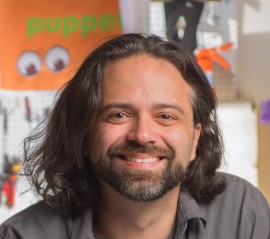
"Expressive Computational Systems For Human Creativity"
Speaker: Brian Magerko
Date: 2018-09-06 12:00:00
Location: TSRB (1st Floor Ballroom)
ABSTRACT
How can creativity drive our experiences with technology, how we learn and create? This talk will explore our relationship with technology and each other through the lens of expressive computing. Personal expression in computing can be used as motivational content for learning how to code, how to explore our own personal creativity, and how to make new kinds of connections to technology. We will introduce the EarSketch environment, a computational music learning environment with over 160K users worldwide. We’ll show how this work can empower underrepresented populations in computing and have measurable positive changes on their attitudes towards computing. This will lead to a discussion on being co-creative with computers as collaborators, introducing our work on computational creativity and improvisational AI systems. This talk will illustrate how expressive computing can enable us to be more computationally literate and creative, both of which may be increasingly valuable in the technological age.
SPEAKER BIO
Dr. Magerko is a Professor of Digital Media, Director of Graduate Studies in Digital Media, & head of the Expressive Machinery Lab at Georgia Tech. He received his B.S. in Cognitive Science from Carnegie Mellon (1999) and his MS and Ph.D. in Computer Science and Engineering from the University of Michigan (2001, 2006). His research explores how studying human and machine cognition can inform the creation of new human/computer creative experiences. Dr. Magerko has been research lead on over $15 million of federally-funded research; has authored over 100 peer reviewed articles related to computational media, cognition, and learning; has had his work shown at galleries and museums internationally; and co-founded a music-based learning environment for computer science - called EarSketch - that has been used by over 160K learners worldwide. Dr. Magerko and his work have been shown in the New Yorker, USA Today, CNN, Yahoo! Finance, NPR, and other global and regional outlets.
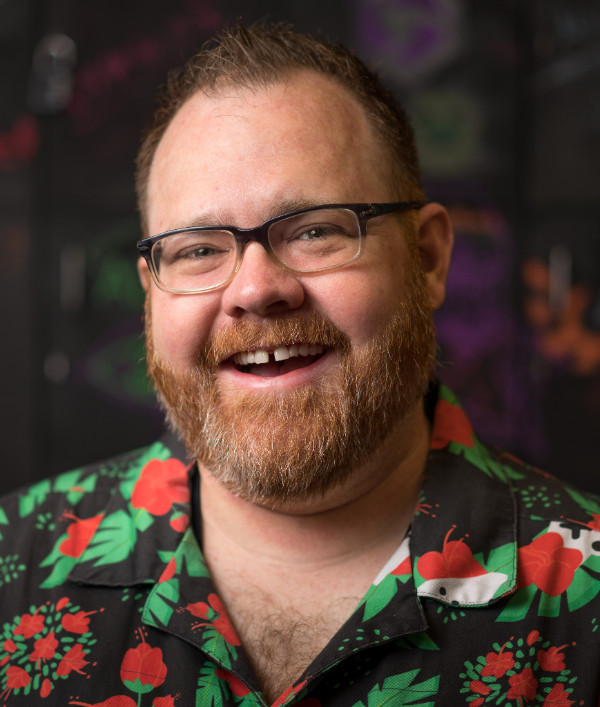
"Playing with Your Health: Onboarding, Designing and Developing Playful Medical Software with Patients, Clinicians, and Researchers"
Speaker: Roger Altizer
Date: 2018-08-30 12:00:00
Location: TSRB (1st Floor Ballroom)
ABSTRACT
Clinicians and researchers alike are being incentivized and resourced to develop new digital tools aimed at lowering the costs of, increasing access to, improving the safety of, and helping patients adhere to various healthcare programs. Various disruption and innovation programs and mechanisms have emerged to encourage the trend and tend to focus on providing resources in the form of rapid prototyping labs and training in various business methods and models, such as the Lean LaunchPad. The same resources and training are rarely available for software development. With little experience in design or development, many passionate and well intended health scientists find themselves creating derivative work, over-scoping projects, or not how to play the role of a client when hiring a developer. This can lead to problems with budgets, managing intellectual property, and design. In short, doctors, nurses and social scientists are being asked to, and are frequently eager to, become software developers, but without any training or knowing where to find the best practices to help guide them in development. While the promise of apps, games, and other software as a means to engage patients and help them adhere to prescribed treatments holds great appeal to a good many in health sciences, porting the type of prescriptive thinking that is commonplace in medicine does not align with the more open, playful ways that users engage with games, apps, and digital tools. Users do not always engage with software the same way they do prescribed medicine. Looking at success and failures from the Therapeutic Games and Apps Lab at the University of Utah, this talk will tackle two key ideas: the utility of having game and development oriented faculty on a health sciences campus, and how design and playful vs. workful thinking can open doors to novel health software solutions. Both of these ideas not only have the potential to reduce the cost of software development, but to prevent clinicians and researchers from the frustrations experienced by first time software developers by teaching inductive design processes and development pipelines. This has been effective in shifting the style of research from one grounded in deductive practices to inductive ones that allow for greater participation from all parties involved (giving not only scientists, but patients and developers voice in the process). This talk will also, briefly, go over the Design Box, a participatory design method to help interdisciplinary teams increase buy-in, understand design spaces, and develop novel solutions.
SPEAKER BIO
Roger Altizer is the Director of the Therapeutic Games and Apps Lab, the Director of Digital Medicine at the Center for Medical Innovation, the cofounder and Associate Director of the Entertainment Arts and Engineering Program and an Associate Professor in the Health Systems Innovation Research Division of the Population Health Sciences Department at the University of Utah. His research focuses on participatory design, playful approaches to health, game studies and serious games. He has worked on dozens of research projects ranging from VR tools to teach choreographic thinking to youth with autism spectrum disorder to adaptive video games designed to teach patients with spinal cord injuries to ski again. As a community engaged scholar, his work appears in publications ranging from Science Translational Medicine to PlayStation Magazine and he has presented on his work conferences ranging from ChiPlay to the Sundance Film Festival and the Game Developers Conference. A former games journalists, Roger now runs a game development lab on the Utah Health campus where he funds 25 graduate students to work with clinicians and health science researchers on medical games and apps.
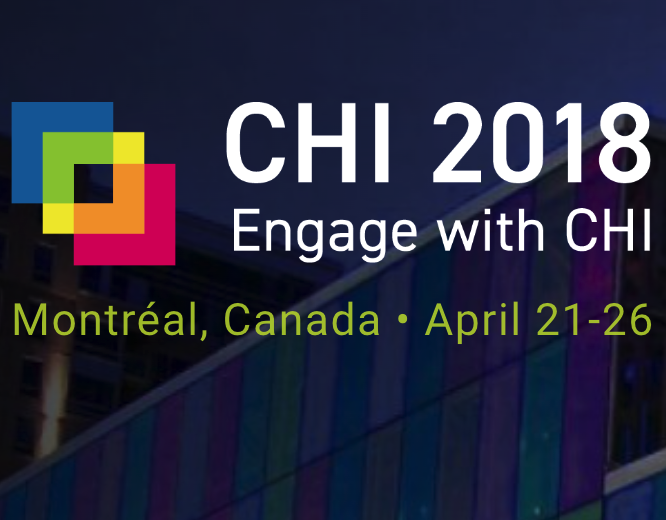
CHI 2018 Preview Talks
Speakers: Eric Corbett, Hayley Evans, Matt Hong, Ari Schlesinger, and John Thompson
Date: 2018-04-12 12:00:00
Location: TSRB (1st Floor Ballroom)
ABSTRACTS
Eric Corbett, The Problem of Community Engagement: Disentangling the Practices of Municipal Government
In this paper, we work to inform the growing space of Digital Civics with a qualitative study of community engagement practices across the breadth of municipal departments and agencies in a large US city. We conducted 34 interviews across 15 different departments, including elected and professional city employees to understand how different domains within local government define and practice the work of engaging residents. Our interviews focused on how respondents conceptualized community engagement, how it fit into the other forms of work, and what kinds of outcomes they sought when they did ‘engagement.’ By reporting on this broad qualitative account of the many forms the work of community engagement takes in local government, we are contributing to an expansive view of digital civics that looks beyond the transactions of service delivery or the privileged moments of democratic ritual, to consider the wider terrain of mundane, daily challenges when trying to bridge between municipal government and city residents.
Hayley Evans, Facebook in Venezuela: Understanding Solidarity Economies in Low-Trust Environments
Since 2014, Venezuela has experienced severe economic crisis, including scarcity of basic necessities such as food and medicine. This has resulted in over-priced goods, scams, and other forms of economic abuse. This talk will present our team's investigation of Venezuelans’ efforts to form an alternative, Solidarity Economy (SE) through Facebook Groups. In these groups, individuals can barter for items at fair prices. This talk will highlight group practices and design features of Facebook Groups which support solidarity or anti-solidarity behaviors. It will conclude by leveraging design principles for online communities presented by Kollock to present strategies to design more effective SEs in environments of low trust.
Matthew Hong, Visual ODLs: Co-Designing Patient-Generated Observations of Daily Living to Support Data-Driven Conversations in Pediatric Care
Teens with complex chronic illnesses have difficulty understanding and articulating symptoms such as pain and emotional distress. Yet, symptom communication plays a central role in clinical care and illness management. To understand how design can help overcome these challenges, we created a visual library of 72 sketched illustrations, informed by the Observations of Daily Living framework along with insights from 11 clinician interviews. We utilized our library with storyboarding techniques, free-form sketching, and interviews, in co-design sessions with 13 pairs of chronically-ill teens and their parents. We found that teens depicted symptoms as being interwoven with narratives of personal and social identity. Teens and parents were enthusiastic about collaboratively-generated, interactive storyboards as a tracking and communication mechanism, and suggested three ways in which they could aid in communication and coordination with informal and formal caregivers. In this paper, we detail these findings, to guide the design of tools for symptom-tracking and incorporation of patient-generated data into pediatric care.
Ari Schlesinger, Let's Talk About Race: Identity, Chatbots, and AI
Why is it so hard for chatbots to talk about race? This work explores how the biased contents of databases, the syntactic focus of natural language processing, and the opaque nature of deep learning algorithms cause chatbots difficulty in handling race-talk. In each of these areas, the tensions between race and chatbots create new opportunities for people and machines. By making the abstract and disparate qualities of this problem space tangible, we can develop chatbots that are more capable of handling race-talk in its many forms. Our goal is to provide the HCI community with ways to begin addressing the question, how can chatbots handle race-talk in new and improved ways?
John Thompson, Data Illustrator: Drawing Expressive Visualizations with Lazy Data Binding (Winner of the Best Paper Award at the CHI Annual Conference)
Graphic designers have been producing infographics and charts well before the recent proliferation of computer generated visualizations. As visualization becomes an increasingly popular medium for storytelling and communication, there is a renewed and growing interest to understand visualization creation from the perspective of graphic design. To solve this problem, we propose a novel visual language that describes the composition and generation of diverse visualizations based on the "lazy data binding" approach. This language builds on familiar graphic design concepts such as vector paths, anchor points and segments, and introduces novel primitives for data-driven authoring.
Data Illustrator offers direct manipulation techniques for easy and flexible visualization authoring. We demonstrate the expressive power of our approach through a range of well-known, real-world examples. Project Website: http://data-illustrator.com/
SPEAKER BIOS
Eric Corbett is a 4th year PhD student in the Digital Media program. His background is in CS and HCI. His dissertation seeks to understand how trust could inform the design of computing technology to support community engagement: the work governments do at all levels to meet and invite the public into the process of governing. Drawing from design ethnographic methods, Eric’s research engages the political and social reality in the growing capabilities of technology by using trust as a probe to explore what new forms of interactions and relationships could (or should) be designed between citizens and public officials in order to support engagement in local democracy.
Hayley Evans is a 2nd year PhD student at Georgia Tech in Human-Centered Computing Program. Her work focuses on technology and global health, and focuses in particular on analyzing and developing technology in the wake of trauma. She aims to understand what role technology can play before, during, and after violence created by mankind. Hayley holds an M.A. in Graphic Communication Management and Technology from New York University and a B.A. in Spanish from Loyola University Maryland.
Matthew Hong is a fourth-year PhD student in the Human-Centered Computing program at Georgia Tech, advised by Dr. Lauren Wilcox. He holds a Master’s in Human–Computer Interaction from Carnegie Mellon University and a B.S. in Cognitive Science from the University of California, San Diego. Matthew’s research focuses on designing technology to bridge critical communication gaps between patients and their caregivers; he is currently investigating ways to support data-driven communication for pediatric patient families in routine cancer treatment.
Ari Schlesinger researches how we can build equity into software, hardware, and the design process. Ari’s work uncovers strategies for addressing complicated tech problems by connecting people, systems, and infrastructure in novel ways.
Ari is PhD Student in Human-Centered Computing at Georgia Tech, advised by Beki Grinter and Keith Edwards. Previously, Ari interned with the Human Experience & Design Group at Microsoft and worked as a Research Project Manager on an National Science Foundation grant.
John Thompson is a PhD candidate in C.S. advised by Dr. John Stasko. John is a graduate of the MS-HCI program at Georgia Tech as well. The Data Illustrator project is a collaboration with Adobe. Georgia Tech alum, Dr. Zhicheng “Leo” Liu, is the co-programmer and advisor on the Data Illustrator Project from Adobe. John will be interning with Adobe Research again this upcoming summer.

"5 Habits of Effective Product Design Teams"
Speaker: Aarron Walter
Date: 2018-03-29 12:00:00
Location: TSRB (1st Floor Ballroom)
ABSTRACT
High functioning product design teams have a few key habits in common-that's what product design veteran Aarron Walter has discovered through research of top teams across market sectors. Companies like Facebook, Airbnb, Disney, and IBM have scaled product teams to reach millions of customers, a feat only possible through thoughtful collaboration and a refined process. In this talk we'll look at the 5 habits that help product design teams do their best work and hear from the leaders at the world's most innovative companies about how their teams solve problems. You'll walk away with actionable insights that can help you refine your process and challenge your understanding of how great products come to life.
SPEAKER BIO
As the VP of Design Education at InVision, Aarron Walter draws upon 15 years of experience running product teams and teaching design to help companies enact design best practices. Aarron founded the UX practice at MailChimp and helped grow the product from a few thousand users to more than 10 million. His design guidance has helped the White House, the US Department of State, and dozens of major corporations, startups and venture capitalist firms. He is the author of the best selling book, Designing for Emotion, from A Book Apart. You'll find @aarron on Twitter sharing thoughts on design. Learn more at http://aarronwalter.com.
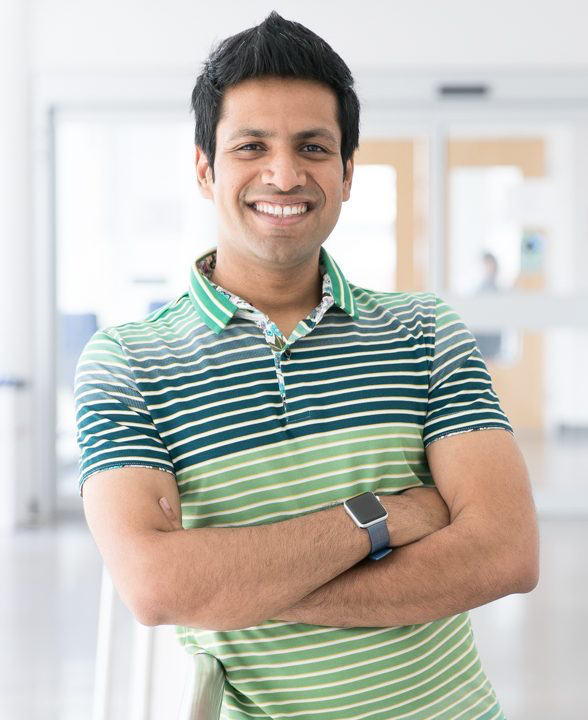
"Teaching Old Sensors New Tricks"
Speaker: Mayank Goel
Date: 2018-03-15 12:00:00
Location: TSRB (1st Floor Ballroom)
ABSTRACT
A fundamental issue with any new sensing technology is the deployment burden. The new technology often comes with a rigid and perhaps expensive list of pre-requisites; and it affects the overall cost-effectiveness, deployability, and accessibility of the solution. For example, a user might find it hard to buy and carry a medical device with them every day. The primary theme of my research has been to reduce the adoption and deployment barriers of new sensing technologies by using the sensors that are already around us. In this talk, I will present my research on extending the capabilities of the on-board sensors on consumer devices for various applications. First, I will discuss how we can leverage the on-device sensors for building health technologies that work as well as their clinically-approved counterparts, and as they continue to evolve through deployments in various parts of the world. Finally, I will discuss how my work in extending the on-device sensors is shaping my interests in informing the design of future consumer smart devices, and how I plan to continue to lower the adoption barriers for new sensing technologies.
SPEAKER BIO
Mayank Goel is an Assistant Professor in ISR and HCII in the School of Computer Science at Carnegie Mellon University. He leads the Smart Sensing for Humans (Smash) Lab at CMU and focuses on designing new sensing systems using sensors and devices that are already present in a user's environment. The lab aims to solve hard problems in various domains, including health sensing, technologies for global development, and novel interactive systems. Some of his inventions are currently deployed in clinics around the world and are used by several thousand patients every month. Many of these technologies are currently going through regulatory approvals. Mayank received his Ph.D. in Computer Science and Engineering from the University of Washington in 2016.
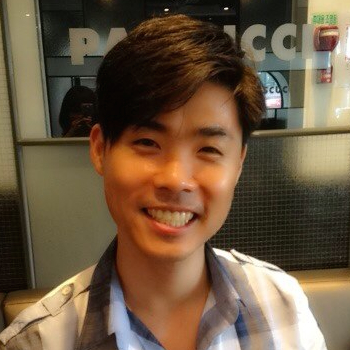
"Character Mining: Machine Comprehension on Multiparty Dialogue"
Speaker: Jinho Choi
Date: 2018-03-01 12:00:00
Location: TSRB (1st Floor Ballroom)
ABSTRACT
This talk presents the Character Mining project that extracts and infers various information about individual characters in multiparty dialogue. The long-term goal of this project is to develop a machine comprehension system that understands human conversations. Currently, this project focuses on three tasks: character identification, emotion detection, and reading comprehension. Character identification is an entity-linking task that identifies each mention referring to a human (e.g., she, mom) as a certain character in the dialogue. We introduce the agglomerative convolutional neural network model that gives the F1 score of 86.76% for this task. Emotion detection classifies each utterance in the dialogues to one of seven emotions (sad, mad, scared, powerful, peaceful, joyful, and neutral). We introduce the sequence-based convolutional neural network model that shows the accuracies of 37.51% and 53.76% for fine and coarse-grained emotions, respectively. Finally, reading comprehension is challenged, where the input documents are dialogues, and the queries are sentences describing events in these dialogues. We suggest several attention-based deep neural models showing accuracies over 72% and robust performance for long documents.
SPEAKER BIO
Jinho Choi is an assistant professor in the Department of Mathematics and Computer Science, the Institute of Quantitative Theory and Methods, and the Program of Linguistics at Emory University. He obtained a B.A. in Computer Science and Mathematics (dual degree) from Coe College in 2002, a M.S.E. in Computer and Information Science from the University of Pennsylvania in 2003 with Mitchell Marcus, a Ph.D. in Computer Science and Cognitive Science (joint degree) from the University of Colorado Boulder in 2012 with Martha Palmer, and did his postdoctoral work at the University of Massachusetts Amherst in 2014 with Andrew McCallum. He was a full-time lecturer in the Department of Computer Science at the Korea Military Academy from 2004 to 2007 while he was serving his military duty in South Korea. He was a R&D team lead of the Amelia project, the next generation machine reading system developed at IPsoft Inc. He is the founder of the Natural Language Processing Research lab at Emory University. He has one several awards and grants including the Yahoo Academic Career Enhancement Awards and the AWS Machine Learning Research Grant.
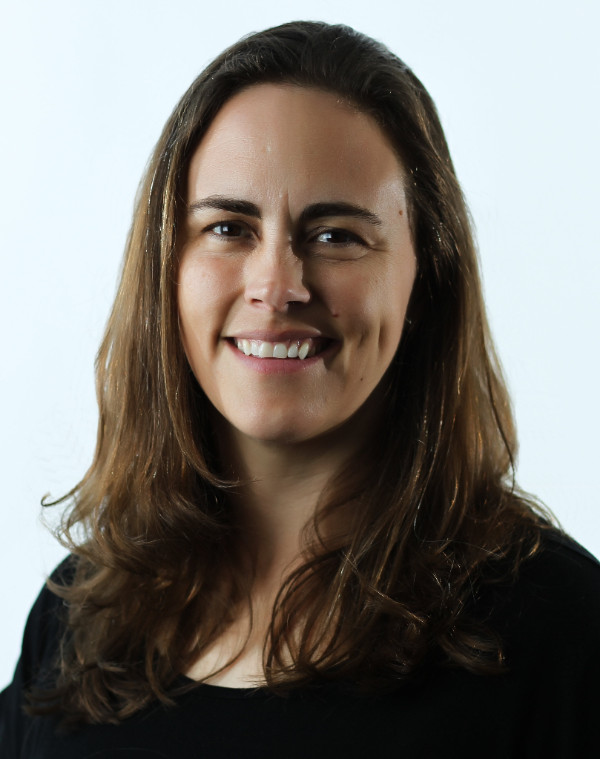
"UX Scale & Evolution @ Uber"
Speaker: Molly Stevens
Date: 2018-02-16 12:00:00
Location: TSRB (1st Floor Ballroom)
ABSTRACT
Uber has achieved global impact with a scale and speed previously not seen in technology. In this talk, Stevens will discuss the challenges and opportunities that the user experience team has encountered working in this fast paced environment - as well as the changes in technology and user expectations that make it more complex.
SPEAKER BIO
Molly Stevens is Director of User Experience Research at Uber and has 15+ years of experience working in user experience design and research across a variety of domains. Stevens is an advocate for the advancement of diverse voices in all aspects of the development of our modern tools and services and has extensive experience in design workshops and sprints. At Uber, her team focuses on developing local and global insights about people to innovate on current and future technologies.

"Foley Scholars Research"
Date: 2018-02-08 12:00:00
ABSTRACTS
Kayla DesPortes, Value-Driven Learning in Physical Computing
Physical computing education has the ability to integrate computing into a variety of domains expanding the possibilities to engage students in personally valuable educational experiences with computing. However, it is difficult to create these personally valuable experiences to accommodate the diversity of students in a learning environment. DesPortes will discuss her work integrating participatory-design processes into physical computing education to scaffold students to reflect on their values and integrate them into their learning experiences. Through this work she has begun to explore the design space of hardware tools to improve the ability for students to learn about the electronics. She will also present her investigations into the modularity of the hardware tools to support collaboration and learning.
Tesca Fitzgerald, Human-Guided Task Transfer in Interactive Robots
As robots become more commonplace, they will need to be able to address a wide variety of problems. Since a robot cannot be programmed to complete every task, it is important for robots to learn new tasks from interaction with a human teacher, as well as transfer their learned skills to address unfamiliar tasks. Fitzgerald proposes a cognitive system enabling a robot to address a range of transfer tasks by (i) analyzing the similarities and differences between the new task and familiar ones, (ii) identifying the level of knowledge abstraction appropriate for transfer, and (iii) collaborating with a human teacher to ground its knowledge abstractions and complete the new task.
Tom Jenkins, Co-Housing IoT
Cohousing IoT is a research through design project that considers emerging domestic technologies and their relationship to alternative living arrangements, particularly cohousing communities. Cohousing is a form of semi-communal living where private homes lie around shared space. Each residence is self-sufficient, but together the community can offer social support that would otherwise be absent. Living in a cohousing community can be understood as participating in a kind of hyper-local civic sphere. The strong community bonds that exist in these communities foster social resilience not found in standard residential arrangements. This unique arrangement makes it clear that traditional assumptions around the smart home fall flat. What would an Internet of Things look like when spread across multiple houses but only one home? This project prototypes speculative Internet of Things devices to support the values of cohousing. Rapid prototyping and other kinds of maker practices provide a way to quickly and simply construct real-world devices to support the values of practices in communities like these.
SPEAKER BIOS
Kayla DesPortes is a PhD candidate in Human-Centered Computing specializing in the Learning Sciences and Technology. Her research focuses on understanding how we can democratize the design and creation of technology through the lens of physical computing education. She investigates the design of educational environments that are inclusive and equitable by focusing on creating learning activities that are responsive to the students values and educational tools that provide the scaffolding necessary to support novice students to create with computing.
Tesca Fitzgerald is a CS PhD candidate in the School of Interactive Computing. Her research vision lies at the intersection of Human-Robot Interaction and Cognitive Systems. Before joining Georgia Tech in 2013, Tesca graduated from Portland State University with a B.Sc. in Computer Science. She is an NSF Graduate Research Fellow (2014), Microsoft Graduate Women Scholar (2014), and IBM Ph.D. Fellow (2017).
Tom Jenkins is a design researcher who combines research-through-design practice with cultural and critical theory to produce speculative electronic artifacts. His work reveals how design can create platforms and systems that support new kinds of social arrangements of people and things and finds uncommon opportunities for ubiquitous computing in the everyday. This practice draws from the fields of interaction design and science and technology studies, and operates in conversation with multiple threads in contemporary design, including critical making and supporting and designing for communities.
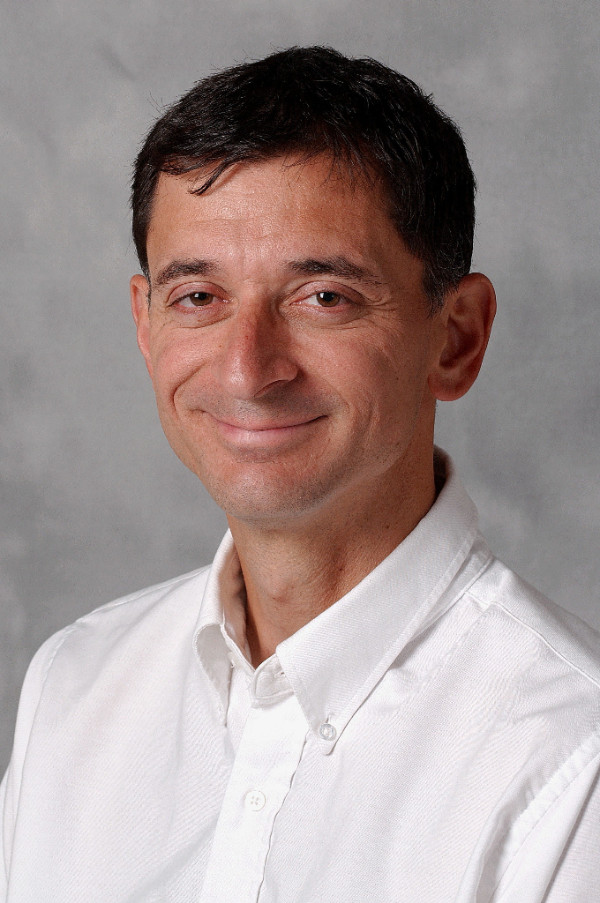
"The Life of a Professional Novice: Task Analysis and Instructional Design"
Speaker: Richard Catrambone
Date: 2018-01-25 12:00:00
Location: TSRB (1st Floor Ballroom)
ABSTRACT
Subject matter experts (SMEs) who teach courses, write textbooks, and contribute to computer-based learning environments, are often “disconnected†from the knowledge they use to solve problems. Much of that knowledge has become essentially automated and therefore the SME can have difficulty articulating it or even realizing that it needs to be articulated. Research on instructional design, educational technology, and problem solving tends to emphasize instructional manipulations at the expense of a careful consideration of what learners need to know. I have developed a task analysis technique called TAPS (Task Analysis by Problem Solving) to elicit the knowledge that SMEs have, and that learners need, to solve problems in a domain. I will discuss the TAPS process and several instructional design and problem solving studies that have utilized TAPS in conjunction with my subgoal-learning model to show how instructional materials can be improved so that learners can learn more effectively and transfer their knowledge to new problems. These projects have been in domains ranging from physics to ballet and have involved instructional materials presented via paper and pencil as well as in multimedia environments.
SPEAKER BIO
Richard Catrambone is a Professor in the School of Psychology at the Georgia Institute of Technology. He received his B.A. from Grinnell College and his Ph.D. in Experimental Psychology from the University of Michigan.
The question Catrambone likes to ask--and the thread that runs through the projects he does alone and in collaboration with others--is: What does someone need to know in order to solve novel problems or carry out tasks within a particular domain?
Catrambone’s research interests include problem solving, educational technology, and human-computer interaction. He is particularly interested in how people learn from examples in order to solve problems in domains such as algebra, probability, and physics. He explores how to create instructional materials that help learners understand how to approach problems in a meaningful way rather than simply memorizing a set of steps that cannot easily be transferred to novel problems. He researches the design of teaching and training materials--including software and multimedia environments--based on cognitive principles that help students learn basic tasks quickly and promote transfer to novel problems. He uses task analysis to identify what someone needs to know in order to solve problems or carry out tasks in a domain and then to use the results of the task analysis to guide the construction of teaching and training materials/environments.
Catrambone has served on the Cognitive Science Society governing board from 2011-2016 and was chair of the Society in 2015. He was co-chair of the Cognitive Science Conference in 2010. He has served as a consulting editor for the Journal of Educational Psychology (1/2008 - 12/2011), the Journal of Experimental Psychology: Learning, Memory, and Cognition (6/2000 - 12/2001 and 1/2009 - 12/2009), the Journal of Experimental Psychology: Applied (1/2001 - 12/2007), and the Journal of Experimental Psychology: General (6/2000 - 12/2001). He has published his research in journals such as the Journal of Experimental Psychology: General; Journal of Experimental Psychology: Learning, Memory, and Cognition; Journal of Experimental Psychology: Applied; Memory & Cognition; Journal of Educational Psychology; Human-Computer Interaction; Human Factors; and other basic and applied journals. He has also served on grant review panels for a variety of funding agencies including the National Science Foundation and the Institute of Education Sciences (U.S. Department of Education).
His research has been funded by organizations such as the National Science Foundation, the Office of Naval Research (ONR), and the Air Force Office of Scientific Research (AFOSR). He has consulted on instructional design and human-computer interaction topics for various organizations. His classroom teaching and student mentoring has been recognized by multiple teaching awards including Georgia Tech's Class of 1940 W. Howard Ector Outstanding Teacher Award.
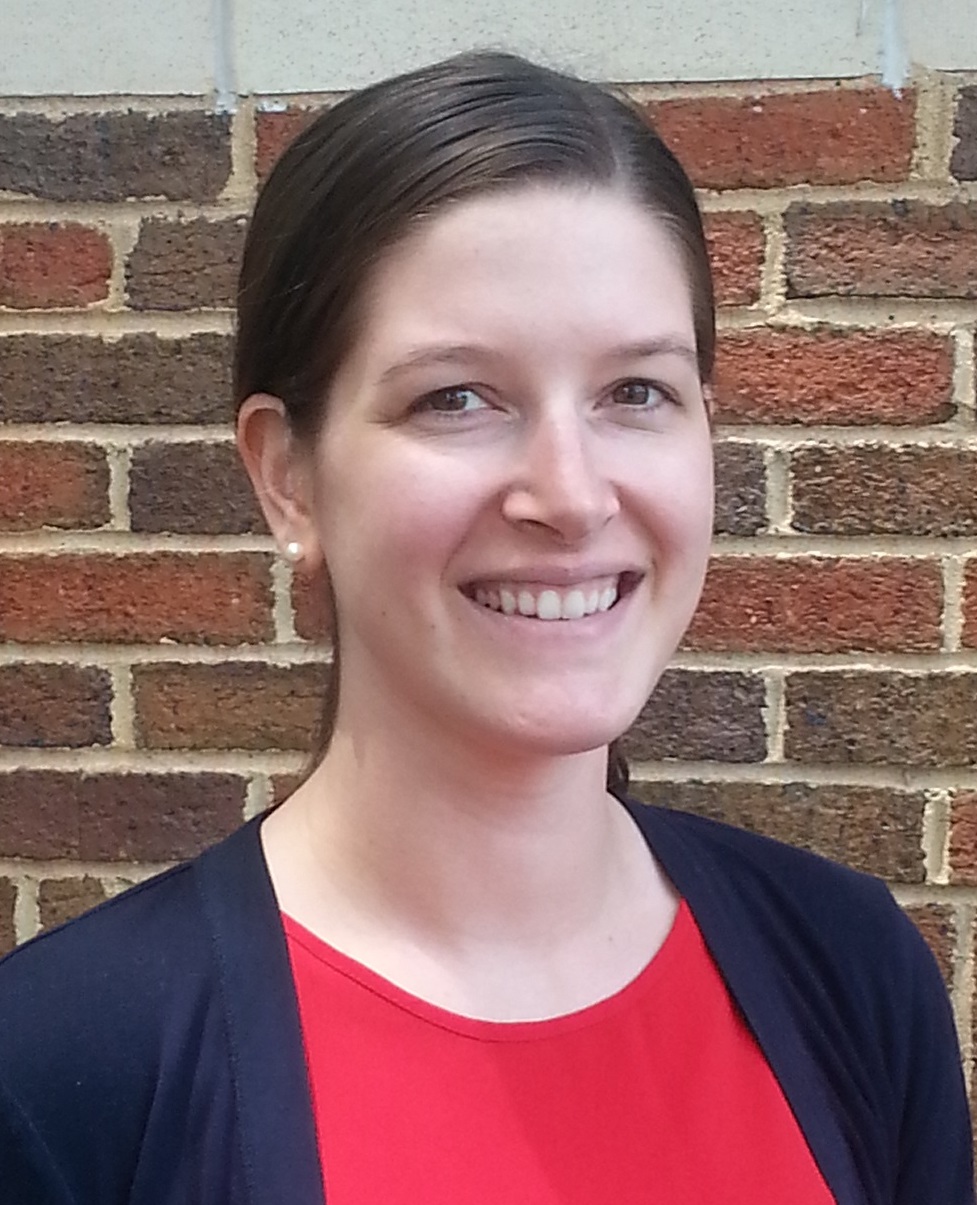
"Helping CS Students... Become Better Problem Solvers"
Speaker: Lauren Margulieux
Date: 2018-01-11 12:00:00
Location: TSRB (1st Floor Ballroom)
ABSTRACT
Problem solving is a complex process that requires domain knowledge, procedural knowledge, and general problem solving skills. Problem solving in computer science adds additional layers of complexity as learners need to consider how to communicate with a machine, account for interconnectivity with other systems, and more. When people try to learn computer science online, they typically cannot use many of the strategies that they have developed through years of schooling. All of these factors add up to a learning environment that stifles success and yet is increasingly used in development of digital literacy and our workforce. In this talk, we’ll discuss the common barriers that learners face as they acquire problem solving skills, why people with a PhD aren’t always the best people to help them, and how to support problem solving in online learning environments. The focus of the talk will be on computer science education at the higher education level, but implications for K-12 and engineering education will also be included.
SPEAKER BIO
Lauren Margulieux is an Assistant Professor of Learning Technologies at Georgia State University. She received her Ph.D. from Georgia Tech in Engineering Psychology, the study of how humans interact with technology. Her research interests are in educational technology and online learning, particularly for computer science and engineering education. She focuses on designing instructions in a way that supports online students who do not necessarily have immediate access to a teacher or instructor to ask questions or overcome problem solving impasses.




